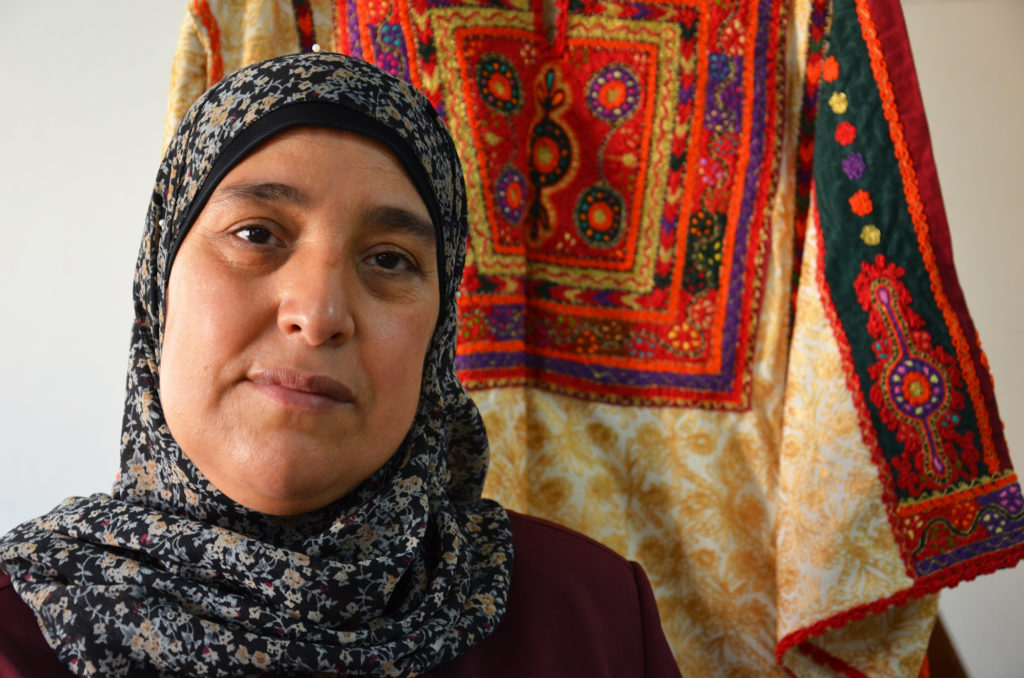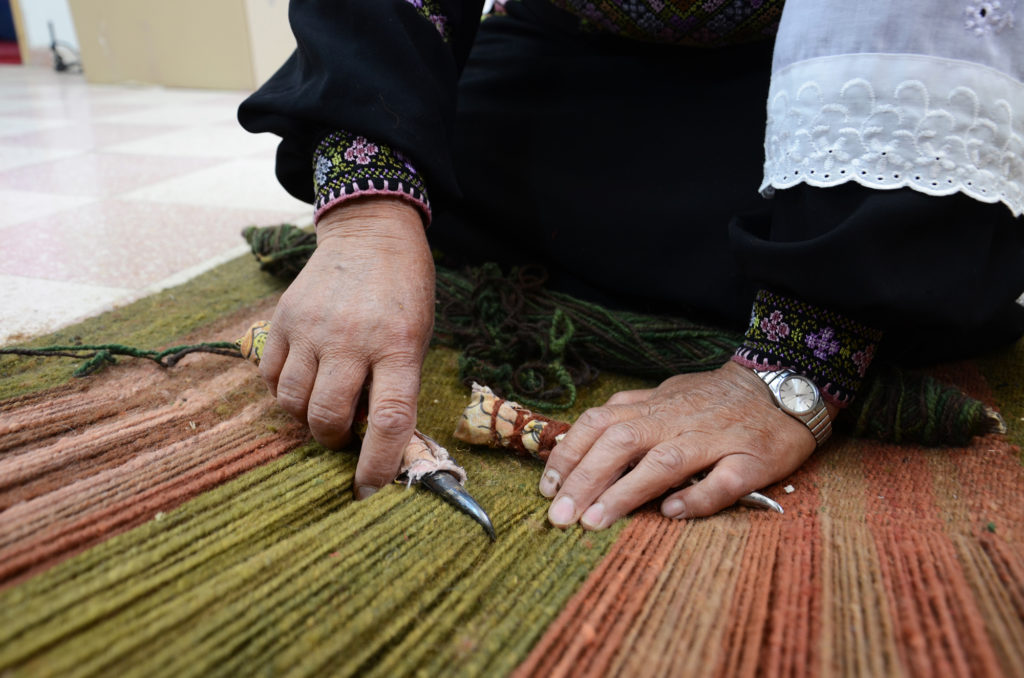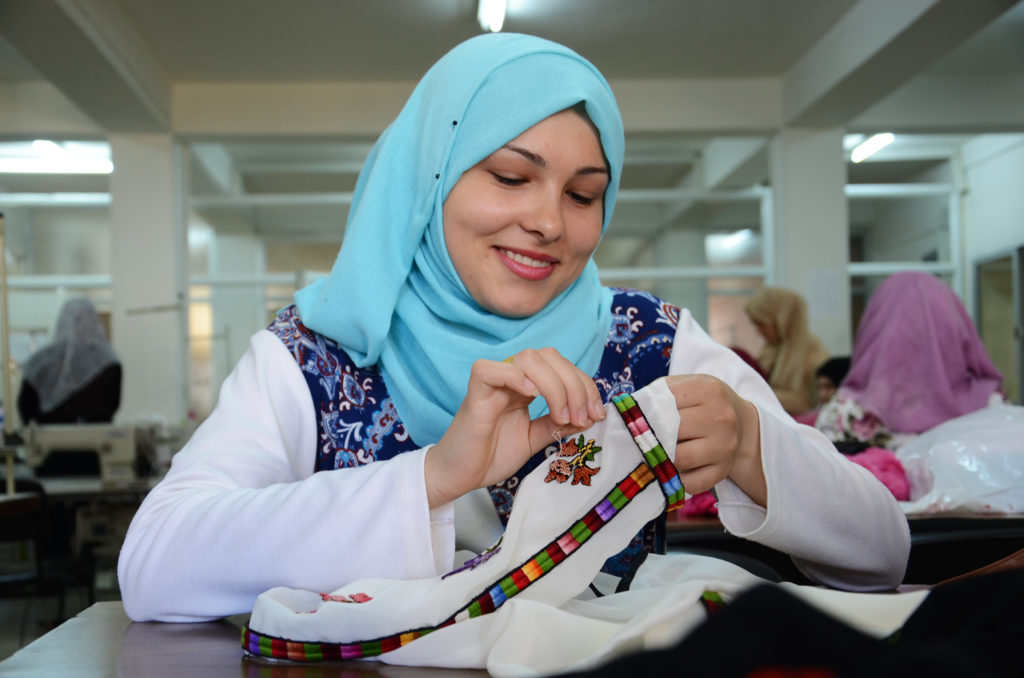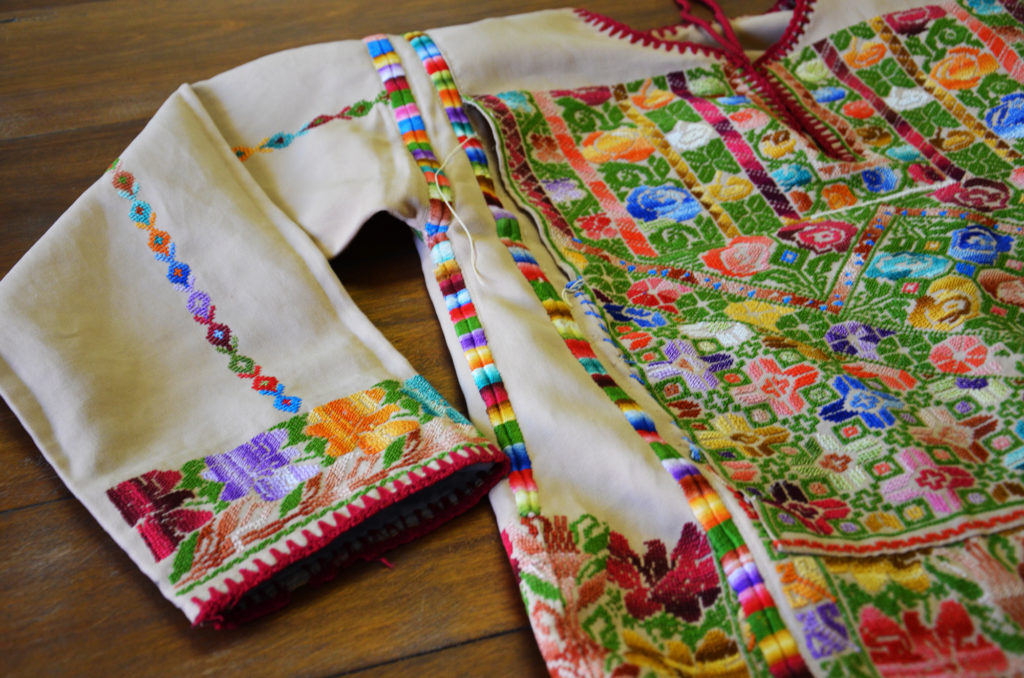The Stories Tapestries Tell
Posted in: Voices from the field
Inside an embroidery workshop in the heart of the West Bank city of Ramallah, Sabah stands at the helm of an important component of Palestinian identity and history. Not only is she an instructor of Palestinian embroidery, but she’s also a keeper of stories accumulated throughout the two decades of her career.
Sabah’s workshop is buzzing with women, young and old, creating their own works of art with little more than thread and imagination. As they watch their needles weaving through canvases between their fingers, they are left to their own thoughts.
Though these women have all come for the common purpose of learning a traditional handicraft, each has been driven by a different reality. Sabah listens intently to each of their stories and remarks, “You see women who are here so they can support themselves or their siblings or parents or children. Others want to develop their own businesses. And others who are searching for a passion and want to express themselves creatively.”


Sabah Zuhur from Ramallah, teacher of Palestinian embroidery.
With a tiny needle and spool of thread, Sabah herself has a point to make. “It’s been 27 years since my father died,” she says. “Toward the end of his life he encouraged me to learn and preserve the heritage of our Jerusalemite town of Lifta, which is famous for its beautiful embroidery patterns. When he died I had just finished high school and had no interest in handicrafts, but his words never left my mind and propelled me to learn embroidery and become the trainer that I am today.”
Embroidery is no easy feat. Depending on the size of the pieces—which range from pillow cases, dresses and upholstery—embroidered goods can take months and sometimes years to produce. In addition to vision and creativity, embroidery requires a great amount of time, patience and skill.
Different Women, Different Stories


Palestinian women practice the tradition of embroidery throughout the West Bank and Gaza.
“Each of us is motivated in her own way,” explains the proud instructor. “For example, Nadia wishes to start a charity in memory of her father.” Nadia is a housewife with a diploma in pharmacy, and says that her parents raised her to be a strong and ethical woman. As she sits beside Sabah, her bright smile beams with positivity. Nadia wishes to make and sell her embroidered pieces and donate the profits to charity, in honor of her late father.
Hilana is another trainee with different ambitions. She hopes that the embroidery training will help her start a small business so she can help her working husband in supporting their three children.
Meanwhile Raja is single and financially independent. She seeks to increase her limited income and to add to her extensive tailoring experience. “I’ve been tailoring dresses since I finished 12th grade,” says Raja. “When my nieces were here on a visit from the United States, they were very excited about the idea of helping me start my own embroidery business.”
When they graduate, Sabah’s students often give her embroidered gifts which she hangs on the walls of the workshop. To her, they are little pieces of the women who made them. She can look at any hanging gift and tell you a sentimental anecdote about the woman behind it, as if it still holds a part of her.


A Palestinian woman takes an embroidery workshop in Ramallah.
Similarly, in the Hebronite town of Idhna, Na’eema Deib weaves her own unique story with determination and steadfastness. When she was 28, her husband walked out on her and their young son. She joined a local women’s cooperative and put her embroidery skills, learned from her mother since age 10, to good use. Now her son is a university graduate, father of six, and the pride of his mother.
Each of the cooperative’s products carries a tag that reads “Women of Hebron.” It’s a reminder that these beautiful art pieces are the creations of women who choose life and beauty despite the despair they see all around them in the city.
Threads of Hope


Threads of hope: Palestinian embroidery
Instability always lurks around the bend for most Palestinians. Add that to high rates of poverty and unemployment and it creates a situation in which Palestinians have to struggle to sustain themselves. Living under occupation, despair seeps into people’s lives. Physical barriers tear the country apart, restricting business and educational opportunities, hindering development and crushing dreams and aspirations.
Although many surrender to that despair, others like Sabah and Na’eema rise above it. The women in the workshop have found opportunity and hope in traditional handicrafts.
Threads have stories to tell. A stitch can carry a prayer or embrace a dream. Sometimes it’s a mirror into the soul of its creator and her life story, if we care enough to listen.
Read more from Nada Dajani’s interview with Sabah in Muftah. Embroidery is also Anera’s Annual Gala theme, Tapestry of Humanity: The Common Thread that Binds Us All. Tickets are on sale now for October 13.
OUR BLOG
Related
In this log, Anera provides regular updates on unfolding hostilities in Lebanon and our response efforts. Our community makes our emergency response possible. Please consider donating today. Our team is working around the clock to expand this assistance, but we…
In this log, Anera provides updates on unfolding war in Palestine and our response. Please stay tuned here for the latest information. To subscribe for weekly updates via SMS on our response in Gaza, text GAZA to 1-866-549-0055. Questions? See…
A Syrian Refugee’s Struggle in Lebanon For 43-year-old Abu Jaafar, survival has become a daily fight. A Syrian refugee displaced by the conflict, he is now living on the streets of Beirut with his five children. Having lost everything to…
